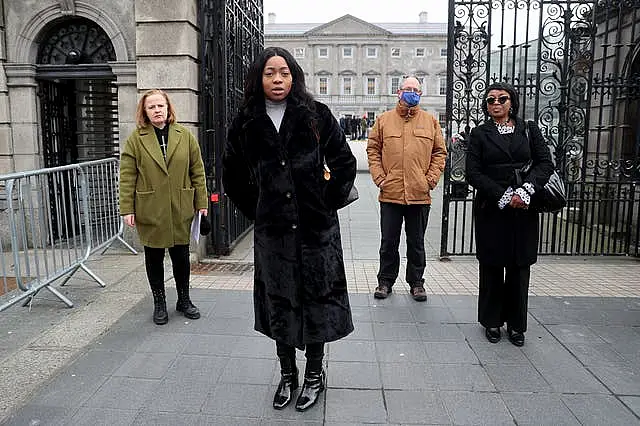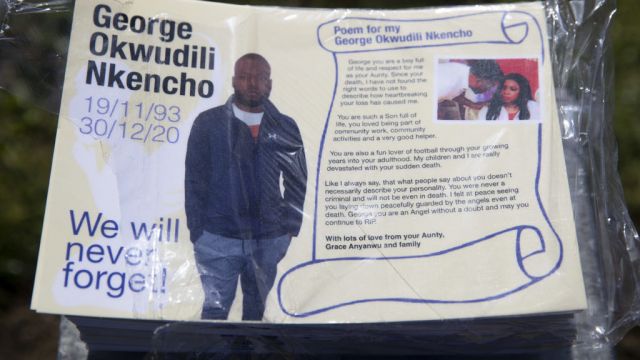The Dáil was briefly suspended on Thursday after a TD criticised the decision not to prosecute gardaí involved in the fatal shooting of a man outside his home.
George Nkencho, 27, died outside his home in December 2020, after being shot multiple times by members of a Garda armed support unit while allegedly brandishing a knife.
He was suffering from mental health issues at the time.
Mr Nkencho’s death was the subject of an investigation by the Garda Siochana Ombudsman Commission (GSOC).
The incident was the subject of an independent criminal investigation by GSOC, which concluded in June 2023 with the submission by GSOC of an investigative file to the DPP.
The Garda Ombudsman said on Wednesday it had been notified by the director of public prosecutions of its decision not to direct a prosecution in the case.

GSOC said it notified the Nkencho family of their entitlement under the Criminal Justice Act to a summary of reasons from the DPP for its decision not to prosecute, as well as their statutory entitlement to request a review of the decision.
A statement issued by the Nkencho family solicitor, Phelim O’Neill, said: “The Nkencho family are disappointed with the decision of the Director of Public Prosecutions not to prosecute members of An Garda Siochana involved in the shooting dead of their son and brother George.
“The family intend to appeal this decision and in the circumstances will not be making any further statements until this process has been concluded.”

In the Dáil on Thursday, Solidarity TD Mick Barry raised the case during Leaders’ Questions: “George Nkencho was shot dead by an armed guard on December 30th 2020.
“He was shot five times, twice in the back.
“Yesterday we learned how the garda who shot him will not now stand trial.
“George’s grieving mother, his sisters and brothers, a working-class migrant family, will now have to fight a long and hard battle for justice, even for basic information, like so many others have had to do in the past.”

Mr Barry compared the decision to the recent State apology to the survivors and families of the victims of the Stardust fire in 1981.
“On Tuesday, the State apologised to the Stardust families, the house rose in standing ovation and everybody said ‘never again’.
“Yet, just one day later, the State appears to many to be doing it all over again.”
At this point, Ceann Comhairle Sean Ó Fearghail told Mr Barry that there was a long-established principle around separation of powers whereby the decision of the DPP “may not be commented on” within the Dail.
“You cannot comment,” he said, adding: “Nobody in this chamber is going to comment on actions, statements or decisions of the courts or the DPP.”
Mr Barry, who contended that it was a rule that no member could be prevented from raising matters of public importance, said the case was a “litmus test” for how the State treats matter of race.
Mr O Fearghaill interjected and said Mr Barry was out of order by continuing and asked him to resume his seat.

When the TD refused to do so, the Ceann Comhairle suspended the house for 10 minutes.
Mr O Fearghaill said “Our hearts go out to Nkencho family. The sympathies of every member of this house are with them and the memory of their son who should not have lost his life – but we’re not going to talk here about the decisions of the DPP.”
When the Dáil returned, Mr Barry rephrased his question to ask whether the GSOC report into the case should be provided to Mr Nkencho’s family and be published.
Agriculture minister Charlie McConalogue, who was taking Leaders’ Questions on behalf of the Government, expressed his “deepest sympathies” to the Nkencho family.

“I know that the community have experienced trauma and the family very much so as a result of these events, and I know that many for many people, this development will be upsetting.”
Mr McConalogue said fatal shootings by gardaí are “very rare in Ireland” but are all independently investigated by GSOC.
He said he could not speak for the DPP and added that family had been advised of its rights to appeal the decision.
Mr Barry said the GSOC report would help provide answers on how gardaí responded to the case and how they deal with mental health crises.
He said the GSOC investigation took hundreds of witness statements, examined video evidence and took 2.5 years.
“It’s not available to George’s grieving mother, his brothers and sisters.
“I believe that report should be published, should be made available.
He added: “I will make the observation, that it is merely an observation, but the level of alienation among young people of colour in this State, from the State is a matter that needs to be discussed and needs to be recognised.
“And I have no doubt that what happened yesterday will deepen and strengthen that alienation, that is something that must be debated and must be discussed.”







